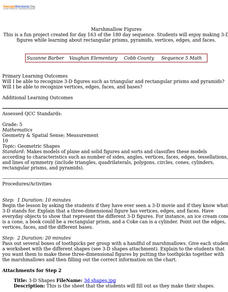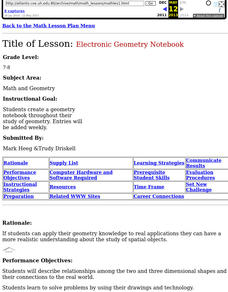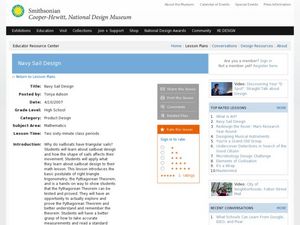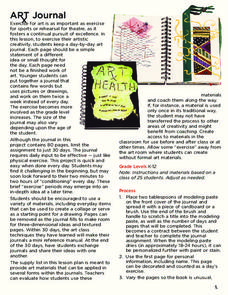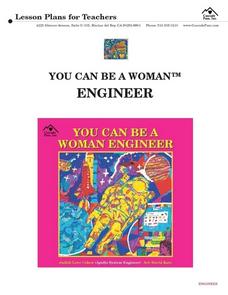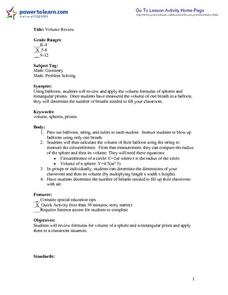Curated OER
Dynamic Collages and Assemblages
Students create a two, three, or four-dimensional collage or assemblage. They use shapes, colors, images, objects, and textures to create their collage.
Teach Engineering
Connect the Dots: Isometric Drawing and Coded Plans
Individuals discover how to draw cubes on triangle-dot paper. They use cubes to build structures and draw corresponding isometric drawings on dot paper in the second lesson of the series of five. The activity also introduces the concept...
Curated OER
Circles, Cylinders, Cones and Spheres
In this comparing geometric figures worksheet, students continue patterns and observe circles. In this problem solving worksheet, students answer seven questions.
Curated OER
A Bird's-eye View
Sixth graders create a chalk drawing of a scene of their choice by using the process and techniques of horizon line, a variety of lines, vanishing points, and three-dimensional techniques.
Curated OER
Mass and Space
Learners view a variety of sculptures analyzing how space and mass interact, and how sculptors make choices about mass and space to express meaning in their art. They make small three-dimensional sketches experimenting with mass and space.
Curated OER
Classification in Action
Students work with a set of objects to set up both quantitative and qualitative classification systems. As a group, students follow an example to design and complete two classification systems using a set of objects provided. ...
Curated OER
Marshmallow Figures
Students enjoy making 3-D figures while learning about rectangular prisms, pyramids, vertices, edges, and faces. After a lecture/demo, students use marshmallows, toothpicks and a worksheet imbedded in this lesson to create 3 dimensional...
Curated OER
Electronic Geometry Notebook
Students examine the relationship between two and three dimensional shapes. They use their drawings to solve problems. They create a notebook of the formulas and how they relate to the real world.
Curated OER
Hands-on Cells
Students review the components of a cell and the differences between plant and animal cells by creating a three-dimensional model of each type of cell. In small groups, they use modeling clay and household object to construct their models.
Curated OER
Worksheet 3
learners conduct an experiment by attaching a belt to a chair. Then they investigate the math concept for how something can rotate in three dimensional space. They graph the solution.
Curated OER
Navy Sail Design
Young scholars use the Pythagorean Theorem to explore sailboat design. In this Pythagorean Theorem lesson, two sides of a triangular sail are measured, and the theorem is used to calculate the third side. A worksheet, bulletin board...
Curated OER
Social Studies: Getting to Know You
Students in kindergarten and college students engage in dialogue designed to help them get to know each other. They meet at three discussion centers, where the students express what makes them happy, how they are seen, and how they are...
Curated OER
Tomato Exploration
Create tomatoes in 15-20 minutes using this fun and interactive lesson plan! Learners listen to a book about tomatoes (recommendations listed), and focus on the vocabulary word tomato. They count the syllables...
Dick Blick Art Materials
Art Journal
Here's a prescription for creativity—keep a daily art journal. Words, images, shapes, objects, all can be used as prompts that exercise the creative imagination. Set aside a couple of moments each day for this engaging activity.
Adrian College
The Universe
Young scientists create a simulation of Hubble's law. Introducing the Big Bang Theory using balloons and a simple lab instructional activity, scholars complete a data table and perform analysis.
Curated OER
You Can Be a Woman Engineer
Students inspect a variety of objects from different points of view. The front, right, side, top and bottom. They then draw a diagram of that object from the point of view chosen. Also, they think of other objects and draw them from...
Curated OER
Faces of a Cube
Students identify and correctly name three-dimensional solids; cones, spheres, and cubes. In this three-dimensional figures lesson, students build a cube by matching colored square faces to a correct word. Students then...
Curated OER
Shape Walk
Students take a field trip to a local park or beach to collect objects. They practice counting the objects and put them into categories according to type of shape like a cone, cylinder, etc... As an extension to the lesson students could...
Curated OER
Line and Shading = Shape and Form
Students collect natural objects and draw these objects with and without shading.
Curated OER
Volume of Rectangular Prism and Cylinder
Learners calculate volume of rectangular prisms and cylinders. They draw and label figures to use the formulas to calculate the volume of rectangular prisms. In addition, they use objects to calculate volume in a hands on activity.
Curated OER
Linear, Square, and Cubic Units
Linear, square, and cubic units are all investigated as different types of packages are measured. The teacher will need supplies such as a box of aluminum foil, a package of ribbon, and a bag of mulch. The class determines the...
Curated OER
Classic Columns
Sixth graders present a PowerPoint presentation on Greek columns. They realize that Greek culture is centered around religion. Students create a model of one of the columns. Also they find examples of Greek architecture in major Greek...
Youth Education Services
Relating Volume in 3D Objects with Ten Problems
A fabulous four-page assignment explores volume formulae for rectangular prisms, cylinders, cones, and pyramids. Pupils apply the formulas to solve problems, match diagrams to values, and address real-world scenarios. A detailed answer...
Curated OER
Volume Review
Students investigate the concepts of volume for rectangular prisms and spheres. They measure the volume of one balloon and then consider how many breaths it would take to fill the room with balloons. The rectangular prism being measured...






